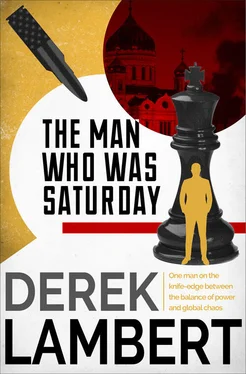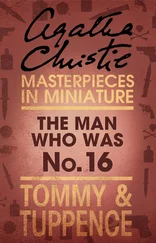‘Guests?’
‘Her mother and father were there.’
‘Step-father,’ Jessel corrected him. ‘Ruth’s finally passed all her exams and got a job teaching handicapped children.’
Who would have thought it? Ruth, one of the flowers of Bostonian society, arrogance her birthright. He saw her shopping in Newbury Street: the street seemed to belong to her.
Jessel said: ‘I presume this girl is stukachi .’
‘An informer? If she catalogues our lives she must be. One in twelve Soviet citizens are supposed to be KGB contacts, aren’t they? But I should think she’s innocent enough. You know, merely passing on updated material to her superiors.’
‘She’s into Women’s Lib isn’t she?’
‘You seem to know a lot about her.’
‘Sure, I do my homework.’
Calder knew that Jessel had contacts other than himself inside the Institute.
Jessel said: ‘Doesn’t that strike you as odd? You know, that a dissident of sorts should be employed there?’ He relit his pipe and blew smoke across the chess board; it smelled of autumn.
‘Ours not to reason why,’ Calder said.
Jessel stroked his long, sparse hair. ‘Aren’t you going to ask about your parents?’
Calder asked; he doubted whether they ever asked about him. His mother, perhaps.
‘Your mother’s fine. Your father had a stroke but he’s going to be okay. Maybe a little speech impediment.’
Calder found it difficult to imagine his father’s diction impaired. That magisterial voice saying grace before lunch – Calder had never quite forgiven God for semolina pudding.
‘How’s my mother taking it?’
‘Bravely. As always. It’s your move.’
Calder stayed with Chigorin. Pawn to bishop four.
Somewhere a clock chimed. He stood up and walked to the window. The floodlights had been switched off but he could see the bluish radiance of the street lights on Gorky Park. He closed the curtains.
Jessel was frowning at the board. What was bothering him about Calder’s play was his uncharacteristic conformity: it upset his own. Calder wondered how the party on Lenin-gradsky was progressing. For the first time he had been accepted by Russians, but only because his presence had been a lie.
Jessel said: ‘Is there still a lot of speculation about Kreiber?’
‘The rumours have become facts. He committed suicide, he was dumped beneath the ice after being knifed in his apartment, he was a double – or should it be triple – agent, a rapist, a homosexual ….’
‘He was a sad sack, ‘Jessel said, not quite touching his queen’s pawn. ‘So the Twilight Brigade is in disarray?’
‘Alarm bells have been sounded, sure. If Kreiber was murdered then the comrades were clumsier than usual. That blood on the edge of the ice ….’
‘And you, do you think he was killed?’
Calder shrugged. ‘It’s your move.’
‘Do you anticipate any more deaths? No one thinking of trying to get an exit visa?’
‘You must be kidding, ‘Calder said.
‘Not even figuratively? You know, retracing their footsteps.’
‘You think they’d tell me if they were? If they confided in anyone it would be Dalby.’
‘Alas, he’s not my pigeon.’ Jessel moved. P-Q4 as Calder knew he would.
Calder sat down and tried to concentrate but the firewater had frozen in his veins and his head was full of ice. He looked at Jessel who was examining his pipe the way pipe-smokers do, as if he had only just discovered it protruding from his mouth. ‘I quit,’ Calder said.
Jessel appeared mildly surprised; disconcerted never. ‘You really put one on, didn’t you?’ His speech was a curious mixture of slang and protocol English.
‘Do you mind if I go to bed?’
Jessel stood up. ‘It’s your bed.’ He picked up his coat and Persian lamb hat from the sofa. ‘Laura will be surprised to see me home so early.’ Jessel was very proud of his happy marriage and tried to keep his home in one of the complexes reserved for foreigners as American as possible. Calder found his visits disconcerting, their purpose questionable; he tolerated them because Jessel kept him informed about Ruth and Harry. In the past he had tried to contact Ruth but his letters had been returned unopened and her telephone number was no longer listed. ‘I’ll be in touch. Any messages?’
‘None.’ There wasn’t any point: he was his family’s shame. He hoped Ruth had put antiseptic on Harry’s knee.
Jessel let himself out of the apartment, closing the door softly behind him. Calder waited until he heard the clatter of the elevator gates, then went into the bedroom.
The phone shrilled as he was lowering his head gently onto the pillow. When he picked up the receiver he heard breathing.
‘Hallo.’
The breathing was slow and measured.
‘Who’s that?’
Click.
He stared at the receiver for a moment before replacing it.
He laid his head on the pillow; above him the moulded ceiling spun like a dying top. He closed his eyes. He was playing chess with Stalin and he was losing. When Stalin called: ‘Check,’ he leaned across the board and pulled his shaggy moustache. It came off in his hand.
CHAPTER 5
The next to die was a fat Italian named Bertoldi.
He died, paradoxically, at a time of hope – the thaw. Moscow rang to the music of water. Dripping from dwindling icicles, plunging down drainpipes, frothing in the gutters. Listen carefully and you could hear the accompaniment – wet snow falling thickly from rooftops and, in green-blushing parks, tentative bird-song. On the river this April day the ice was on the move and in the streets Muscovites straightened up from winter. A time of hope. But not for Alfredo Bertoldi.
Since he had come to Moscow five years ago, blown, it was said, as financier for the Red Brigade, unsuspected for years because you expected Red Brigadiers to be young and fierce and Bertoldi was neither of these things, he had mourned. For pasta. For girls on the Via Veneto who wore nothing but fur coats and high heels. For Neapolitan songs. For God, Italian style.
Hopeless lamentations when, because you were a gangster rather than a fugitive keeper of secrets however cob-webbed, you were housed in a cramped studio in the foreigners’ complex on Kutuzovsky Prospect, named after the field-marshal who sent packing another intruder, Napoleon.
Despite the lack of pasta Bertoldi perversely grew fatter on Chicken Kiev spurting with butter and black bread and assorti ice-cream which he bought even in minus 20 degrees. But it wasn’t the healthy, baritone fatness of an Italian enjoying his sustinence: it was the bloated corpulence of the compulsive eater, the worrier.
His departure from this life of regret was spectacular. A few tenants were strolling in the courtyard of the barrack-block apartment blocks where foreigners – diplomats and journalists mostly – were housed together in the interests of surveillance. It was 10.35 am. The sun had already melted the temporary skating rink, tyres hissed excitingly on Kutuzovsky, even the two militiamen posted at the gates to check visitors were smiling.
Suddenly the windows of an apartment on the fifth floor were flung open with such force that the glass shattered. And there stood Bertoldi in a scarlet dressing gown. Later some witnesses were to testify, unofficially and without any degree of certainty, that they had observed movements behind the obese Italian; others were equally convinced that Bertoldi had stood alone.
What was undisputed was the manner of his fall. He seemed to float supported by the scarlet wings of his dressing gown. There was, it was asserted, a monstrous grace about his exit. His scream lasted from the window to the ground.
Such was his bulk that when he hit the concrete he spread. Within fifteen minutes the mess was cleaned up by militia and taken away in an ambulance.
Читать дальше












